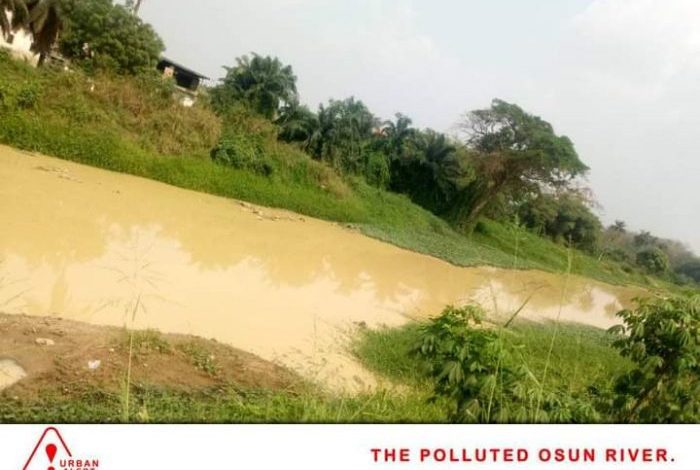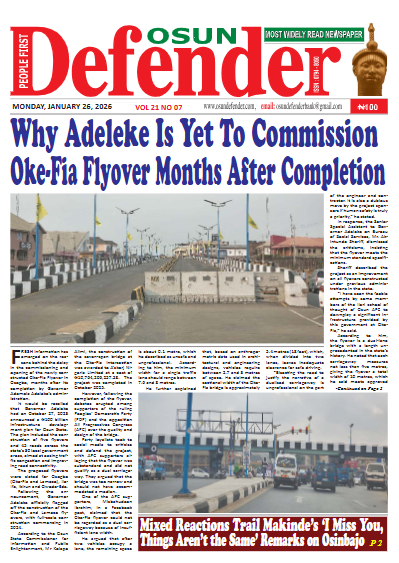Osun River Contamination: 100m Traditional Religion Practitioners To Be Affected Worldwide

The contamination of Osun River by mining activities in Osun State will go beyond the state and Nigeria in effect and impact.
A report by a nongovernmental organisation, Urban Alert, which has for years been advocating for the remediation of Osun River, revealed that no fewer than 100 million African traditional religion practitioners worldwide would be indirectly affected by the contamination.
Urban Alert, has through various research and physicochemical tests established the presence of lead, cyanide and mercury in the contaminated Osun River.
According the organisation, the sudden presence of more than 100 illegal gold mining sites with poor waste management plans now affects the Osun River and other tributaries.
Presenting a document on Osun River contamination to the public via zoom on Wednesday, Urban Alert, led by its Executive Director, Anthony Adejuwon, stated that 42.5 million Yoruba people will also be affected indirectly by the pollution.
READ: Govt. Begins Reclamation Of Osun River
According to the group, the contamination will have a direct impact on a total of two million people living in over 20 communities in Osun State and one million local traditionalists.
Part of the document reads: “Sometimes in 2018, water in the Osun River began to wear a brown colour. Initially, residents thought the change resulted from flooding, which would only be a temporary issue, but after more than four years, the change has continued to create apprehension among residents.
“The change in colour which implies that the river has been contaminated has exposed communities that rely on the river as their source of water aquatic lives and to poisonous materials.
“Residents of communities around the 213.08km Osun River revealed that the change in colour of the river is a result of gold mining activities in some parts of Osun State. Several investigations have also affirmed this. Several scientific studies have also established this.
“The increase in the level of gold mining activities in some parts of Osun State cannot be unconnected with the brownish colour of the water flowing through the Osun River. The sudden presence of more than 100 illegal gold mining sites with poor waste management plans now affects the Osun River and other tributaries.
“The Osun that serves multiple communities in terms of their daily needs for water in different aspects is also a threat to living sustainably within their environment.
“Culturally, the pollution also affects people’s religious and cultural identity as the sense of the sacred attributed to the Osun River is being violated by the pollution. In the first instance, the Osun River is central to the cultural heritage weaved around the Osun.”
Urban Alert called on the Federal and Osun State governments to be sincere in their approaches to the remediation of Osun river.
“Restoring the Osun River and other rivers affected by illegal and unregulated mining activities demands a ‘sincere’ approach by the Federal Government of Nigeria and Osun State government, and other stakeholders.
“Government should extend sensitisation campaigns to host communities and miners. With regard to the host communities, the campaigns should focus on the protocol for initiating a new mining project by companies, and the rights they are entitled to under the solid minerals and regulatory framework, the obligations of miners; environmental protection laws, health and safety issues; as well as relevant institutions to be involved in the sector in Nigeria, amongst other key issues.
“There is a need for the remediation of the Osun River and the polluted environment. To do this, the Federal Government, in collaboration with the Osun State Government and other stakeholders, must design and implement a remediation plan that will detoxify the river and the environment.
“Due to the socioeconomic, health and environmental impacts of the Osun River contamination on two million lives, tourists, traditionalists, and the African belief system, remediation needs to be done urgently”, the group recommended.

Ismaeel Uthman is an Editor, Media Consultant with over 14 years experience in print journalism.
A consummate writer and reporter, Uthman has received accolades for his works, especially one that appeals for good governance and community development. He is a recipient of many laurels, including the Best Investigative Reporter (Print) Award of the Nigeria Union of Journalists, Osun State Council, in 2020.









